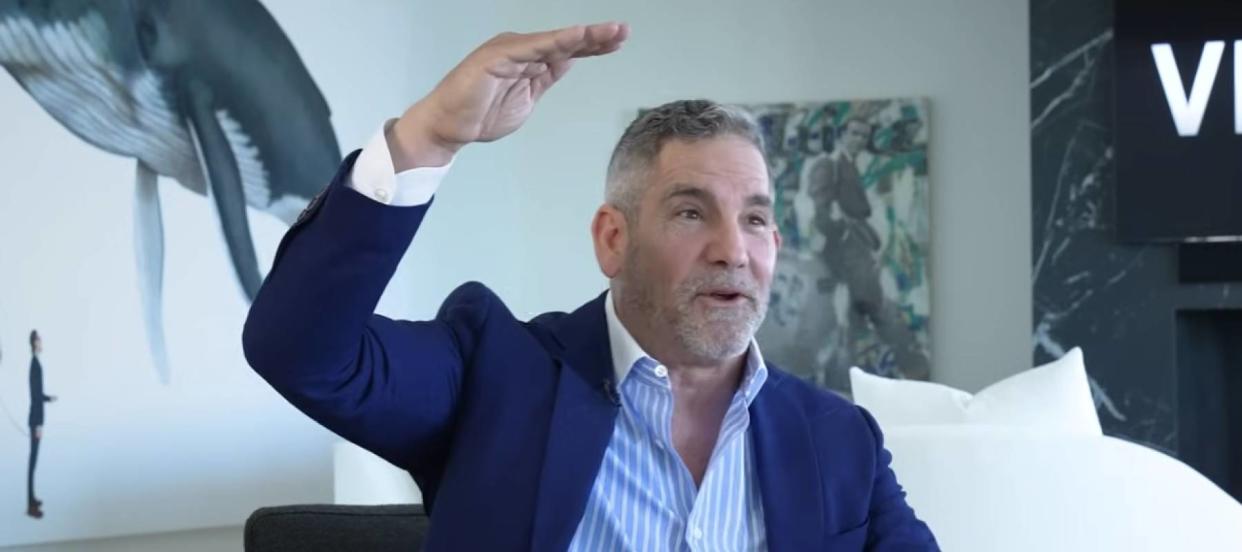‘I didn't keep up with the hammering': Grant Cardone says even though his cash earns between 3.5% and 5.5% he's actually losing money on it — here's why and how to protect your own funds

Even wealthy investors aren’t immune from making rookie mistakes. That’s what real estate investor Grant Cardone discovered when he lost a tremendous amount of money to taxes and inflation in recent years.
“I didn’t keep up with the hammering,” he admitted in an interview with YouTuber VladTV. Cardone claims he had $500 million in a sweep account at a bank. The money serves as dry powder for a potential commercial real estate deal but he argues it’s been losing value while it sits there.
Don't miss
Commercial real estate has beaten the stock market for 25 years — but only the super rich could buy in. Here's how even ordinary investors can become the landlord of Walmart, Whole Foods or Kroger
Car insurance premiums in America are through the roof — and only getting worse. But 5 minutes could have you paying as little as $29/month
These 5 magic money moves will boost you up America's net worth ladder in 2024 — and you can complete each step within minutes. Here's how
Cardone says his cash earns between 3.5% and 5.5% on average, but the net return is far lower. “I don’t want 5% on my money,” he said. “That's all taxed at my rate [it] is taxed half, so I earned 2.7%. And I didn't keep up with inflation. I didn't keep up with the hammering. [I’m] actually losing money by keeping it there.”
Average annual inflation rate for the United States was 3% for the 12 months ending in June, so Cardone’s cash hoard has certainly lost purchasing power after taxes. He’s not the only one getting “hammered.” Warren Buffett reportedly has $189 billion in cash that’s also subject to the same inflation rate.
“The arithmetic makes it plain that inflation is a far more devastating tax than anything that has been enacted by our legislatures,” Buffett once said. Here’s how savvy investors avoid this invisible tax on their fortune.
Real estate
Cardone’s preferred asset class has a reputation for being a hedge against inflation. Housing and real estate are key components of the cost of living, so when rent, home prices and mortgage rates rise so too does the inflation rate. In other words, real estate retains its value during periods of high inflation.
Analysis by Avison Young found a correlation between real estate’s total return and inflation, with the correlation rising when property was held for longer durations.
With this in mind, you could add some exposure to real estate to mitigate the impact of inflation on your portfolio.
Read more: Car insurance rates have spiked in the US to a stunning $2,150/year — but you can be smarter than that. Here's how you can save yourself as much as $820 annually in minutes (it's 100% free)
Stocks
Buffett’s preferred strategy to beat inflation is to bet on robust and growing companies. His argument is that productive, high-quality businesses with pricing power can simply pass the effects of inflation onto their customers.
This theory is backed by data. Charlie Billelo of Creative Planning adjusted the S&P 500’s total returns for inflation and found that the index delivered 840% since 1994. Over that same period, the purchasing power of the U.S. dollar has declined by 52.8%.
A low-cost index fund, such as the Vanguard S&P 500 ETF might be the most convenient way to add exposure to stocks. Year-to-date the ETF is up 15.29%, far outperforming inflation and Cardone’s cash in the bank.
Gold
Gold is the original hedge. Central banks across the world hold the precious metal in reserve for economic stability. Meanwhile, some investors consider it an ideal hedge against inflation and the declining value of the U.S. dollar.
Billionaire investor Ray Dalio, for instance, has said he owns gold as a hedge against rising government debt across the world and sticky inflation.
However, not everyone is as confident in gold’s ability to hedge against inflation. Reuters found that only 16% of the price action of gold since 1971 could be explained by the prevailing inflation rate. Similarly, Marc Fandetti, a portfolio strategist at Armstrong Advisory Group, found that the inflation-adjusted price of gold was actually lower today than it was in 1980.
Nevertheless, adding a gold fund such as SPDR Gold Shares (GLD) could be a good way to diversify your portfolio.
What to read next
Cost-of-living in America is still out of control — use these 3 'real assets' to protect your wealth today, no matter what the US Fed does or says
Jeff Bezos and Oprah Winfrey invest in this asset to keep their wealth safe — you may want to do the same in 2024
Stop crushing your retirement dreams with wealth-killing costs and headaches — here are 10 'must-haves' when choosing a trading platform (and 1 option that has them all)
This article provides information only and should not be construed as advice. It is provided without warranty of any kind.
